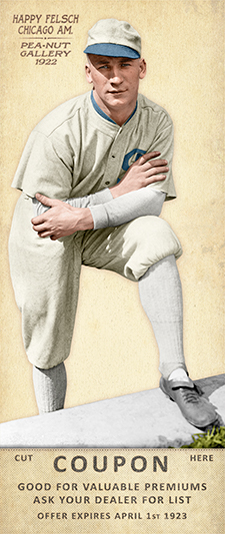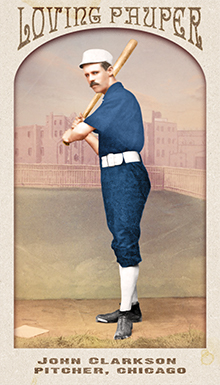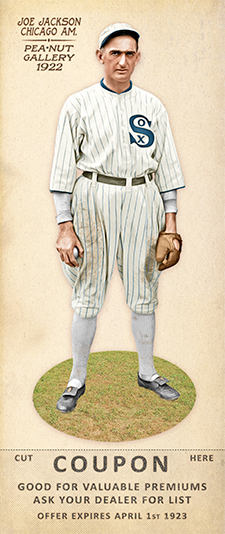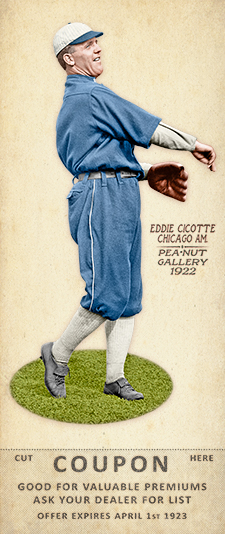- Series: 1919 Black Sox Scandal
- City: Chicago
- Team: White Sox
- League: American League
Joseph Jefferson Wofford Jackson (1887-1951) had the “perfectest” swing according to Babe Ruth who copied it. After nearly a century of more contenders, many would still say Shoeless Joe was the purest hitter ever to wield a baseball bat. Expelled from baseball by Judge Landis, Jackson lives in infamy despite demonstrating prowess at the plate and grace afield. While he will ever be branded with the “Black Sox,” Jackson stirred passions that still echo in baseball today.
- Still ranks as the third-highest career batting average in history (.356)
- His .408 average in 1911, his rookie season, is sixth-highest in the modern era
- Series: 1919 Black Sox Scandal
- City: Chicago
- Team: White Sox
- League: American League
Charles Arnold Gandil (1888-1970) was described in the Chicago Tribune in March 1917 as “the ideal type of athlete – a fighter on the field, a player who never quits under the most discouraging circumstances and … is one of the most dangerous batters in the league when a hit means a ball game.” This tribute heralded Gandil’s return to his original club, Charles Comiskey’s White Sox. He didn’t set the world on fire in ’17 and ’18 but the club became a strong favorite to win it all in 1919. Rife with dissension directed at the miserly owner, by his own admission in a 1956 SI account, Gandil led a conspiracy to throw the Series. Everything came undone and by 1921 eight Sox players were banned for life. Gandil admitted to being the main instigator of the affair but insisted the actual Series losses were unintentional.
- Was a stand-out first-baseman for Clark Griffith’s Senators
- Lifetime BA of .277

- Series: 1919 Black Sox Scandal
- City: Chicago
- Team: White Sox
- League: American League
Oscar Emil Felsch (1891-1964) was a sunny-tempered soul, the epitome of the hail-fellow-well-met. Born into the German community of Milwaukee, Felsch excelled at baseball and went on to become the star center fielder for the Chicago White Sox for six seasons spanning the most tumultuous era in franchise and baseball history. Charles Comiskey brought Hap to the Windy City in 1915 as part of one of the most successful rebuilding efforts in the game’s history. Felsch joined future Hall of Famer Eddie Collins and the incomparable “Shoeless” Joe Jackson, forming a club that would become a dominant force in the American League through the WWI years. Indeed, he forged the kind of career that Jim Nitz of SABR states might have been remembered “as one of the best all-around center fielders in baseball history.” He led his hard-hitting team in home runs and slugging, he was a league-leader in both offensive and defensive stats. And everybody loved Hap.
Years after the sordid story of the Black Sox had waned, Felsch, amiable as ever, was virtually the sole source for writer Eliot Asinof’s Eight Men Out. Hap was as humble as he was forthright in recounting his role in the scandal that shook baseball and ushered in the Judge Landis autocracy that forever changed the structure of the game. “I shoulda knew better,” moaned the aged and infirm former slugger. Earlier he had testified to foreknowledge and acquiescence to the gamblers’ schemes, but always denied actively trying to lose a game, much less the Series.
Despite his reputation for a very sociable demeanor, Felsch suffered under the indignities inflicted by miserly Comiskey. Injuries, his brother’s war wounds, his father’s illness, all took a toll as well in 1919, as did the clubhouse friction between players riven by the war effort. Felsch, Jackson and others had taken defense-industry jobs in ‘18 while others had enlisted. Rivalries erupted and friendships were damaged. Into the tensions stepped unctuous underworld minions of east coast mobsters. The resulting scandal enmeshed Felsch and he never pretended innocence.
- After being ousted from organized ball by Landis, Felsch endured years of litigation mingled with varying efforts to play ball. Eventually he went north and enjoyed success in Canadian circuits while always maintaining the love and support of his hometown
- Series: 1919 Black Sox Scandal
- City: Chicago
- Team: White Sox
- League: American League
Edward Victor “Knuckles” Cicotte (1884-1969) won 208 games and a World Series with the White Sox in 1917. The Sporting News said in 1918 that “Perhaps no pitcher in the world has such a varied assortment of wares….” But it was Eddie’s first pitch of the 1919 Series that plunked Morrie Rath in the back and signaled the fix was in. No one was ever convicted of the infamous Black Sox scandal but Cicotte, with seven teammates, never played ML ball after his tearful confession following the ’20 season.
- Cicotte, Shoeless Joe, and other banned Sox players went on to barnstorm under false names
- His mastery of the knuckleball led to a transformation of his career. His control improved to the point of walking only 89 in 572 innings in 1918/19 combined.

- Series: 1880s: Loving Paupers
- City: Chicago
- Team: White Stockings
- League: National League
- Hall: National Baseball Hall of Fame
John Gibson Clarkson (1861-1909) won 328 games, won the triple crown in 1889 and twice pitched more than 600 innings in a season. In 1885, John appeared in 70 games, threw 68 complete games, 623 innings, won 53, had an ERA of 1.85, a no-hitter, and won the pennant. Apparently having to hurl the sphere a mere fifty feet was a tonic to the arm. But unlike so many pitchers of his era, Clarkson didn’t flame out from such prodigious labor on the mound. From 1885-92 he AVERAGED 36 wins per season and would win 30+ an extraordinary six times. This great career began with the Worcester Ruby Legs in 1882, flowered with Cap Anson’s Sox in ‘84 and fully bloomed in Boston when John followed his ace catcher King Kelly to the Beaneaters in ‘88. League politics that culminated in the Players’ League revolt took a toll on Clarkson’s reputation and sundered his friendship with Kelly as the hurler remained loyal to the Nationals.
- Cleveland acquired John in 1892 allowing him to team with Cy Young. Chief Zimmer, who caught Young for a decade, proclaimed Clarkson the best he ever saw
- Elected to Hall of Fame: 1963
Auction History
Cartophilia
Old Judge Pose: 78-7




